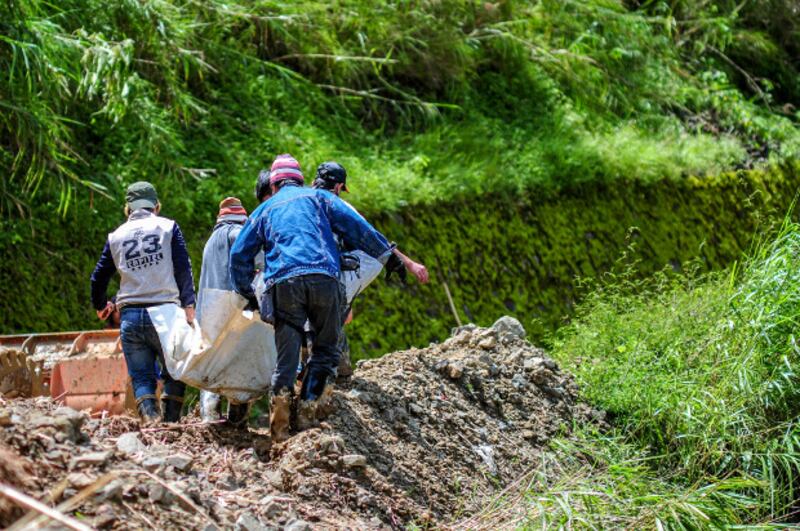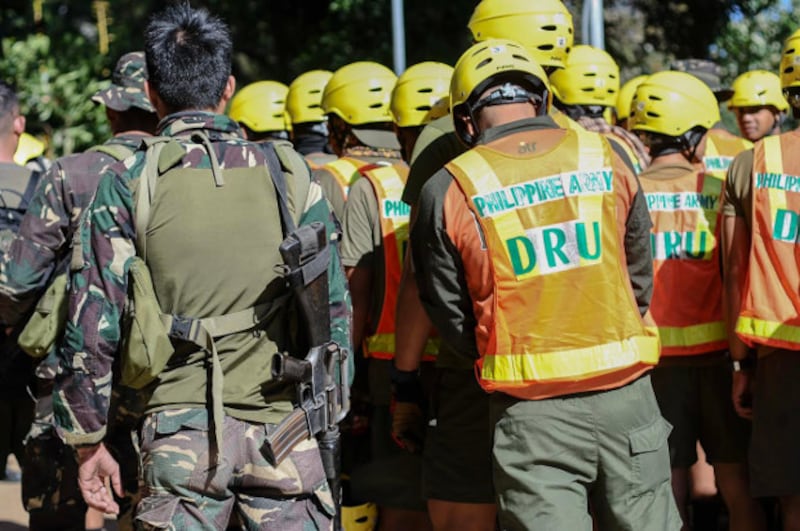Rescuers dug out more bodies from a mining community buried by a massive landslide in the northern Philippines, as the overall death toll from Typhoon Mangkhut reached at least 81 victims, disaster relief officials said Wednesday.
The toll was expected to rise further with officials saying that at least 60 people were still buried in deep mud, which slid off the slopes of a mountain in Itogon town at the height of Mangkhut days earlier.
The Philippine National Police, in an official tally, said 66 people were killed in the Cordilleras, which groups mountain communities including Itogon, and 15 others elsewhere, including in the capital Manila.
Search-and-retrieval operations were continuing in Itogon, a mining town where dozens were believed to be buried by the landslide. Residents and local officials have said that as many as 60 people were still missing.
The bodies of the dead who were found here were hoisted up using ropes, in a search mission that tested the limits of the country's elite fire-fighting search and rescue teams.
Days before the storm hit on Saturday, authorities had gone house to house in the village of Ucab to urge residents to flee to safer grounds, provincial police chief Senior Supt. Lyndon Mencio, told reporters on Wednesday.
"They evacuated but returned to their homes. Some of them stayed at the church and bunkhouses," Mencio said.
He said that rainfall a month prior to the storm had already seeped through the mountain, making it dangerous for potential landslides. "The earth was very loose. The typhoon triggered the landslide," he stressed.

Francis Tolentino, a senior adviser to President Rodrigo Duterte, said it was likely that someone may still be alive under the debris, even as hopes were fading as the days passed.
"We still consider this a rescue operation, not a retrieval operation. I believe some people may still be alive. I reported to the president that we still consider this as a rescue operation, not as a retrieval operation," said Tolentino, who was in the typhoon-affected region.
He noted that there were similar landslide incidents in Nepal and China, where rescuers found survivors after two weeks.
There was one survivor in Itogon who recounted that the locals were at a church morning service hours before the landslide buried their community, Tolentino said.
"The head of the small-scale miners group called them to the church. He showed them the relief items they could eat. They brought the kids. The body of the head of the group was recovered yesterday," he said.

As officials were pointing fingers at who to blame for the disaster, the government imposed a suspension of small-scale mining operations in the region, affecting at least 10,000 people whose livelihoods rely on the mines.
On Tuesday, President Rodrigo Duterte stressed that it was high time to look seriously into the perils caused by the mining industry in the country. He said that frequent landslides across the region were the result of "uncontrolled mining."
"We have a problem with the mining industry. It has not contributed anything substantial to the national economy. Well, one is, of course, the inroads of civilization and the fact that mining has been operating in this country uncontrolled," he said, as he threatened to abrogate a law that deregulated the mining sector.
Jeoffrey Maitem in Cotabato City, Philippines contributed to this report.
